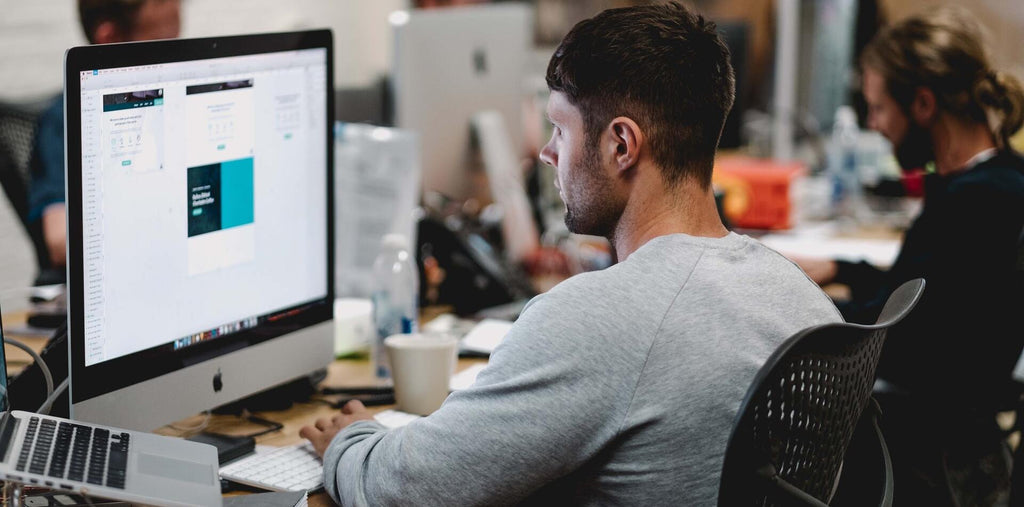How Curiosity, Mistakes, and Self-reflection Help You Grow & Learn
Skills development is a gift you get as early as the start of your career. But going with the flow doesn't help grow or develop your skills. Still, some people might think it's okay not to develop skills because of how busy we are with work. You may lack time to master a new language or learn the basics of team management. That way, you never get an opportunity to focus time or effort on them to make progress when you need it most. Sounds familiar? Then you’re just like most busy adults that don’t have enough willpower to achieve their goals.
Did you notice apathy when thinking about your career plans? University of Phoenix research claims that more than 60% of people feel stagnating in their career & self-improvement. Another bad sign is when you can't name your skills.

If you don't seize every opportunity to cultivate your skillset and miss opportunities to grow, you may spend years without any benefit for your career growth or self-development. Those who picked up skills in their work have more outstanding life balance. For many busy adults, their job isn't just a way to get the means to live but a way to build professionalism.
Constant iterations of skills development are how we improve and empower ourselves. Though, you may find yourself stagnating and drowning in apathy if you don't have a strategy for learning & self-development. Dive in! We're going to discuss the actionable & efficient method to help you grow.
Succesful skill gaining & learning requires action and particular strategy
Developing a strategy for learning and developing new skills means understanding your goals. What skill would I like to learn? In which area where my expertise lie? Where there's a demand for this skill? Why is my goal important?
You can start taking action towards your goal when you have answers. Successful learning & skills gaining is possible only when you put in passion, commitment, and hard work. It requires action. Even if that means taking small steps. Meanwhile, outlining a strategy is an essential step in achieving success. It makes you aware of your strengths, weaknesses, and the different paths you can take to work on improving your skills.

Some strategies can help you harness the power of incremental growth. One of these strategies involves three main cornerstones of your development - curiosity, mistakes, and self-reflection (CMSR). Let's look deeper into this approach and uncover its main perks for you.
CMSR approach to self-improvement & skills development
Curiosity, mistakes, and self-reflection are three indispensable parts of learning and growth. In a nutshell, education is all about making mistakes and the ability to say, "well, I tried something for a bit, and it didn't work." And if you can identify what you made a mistake on, that's even better.
Don't consider it as something you should be ashamed of or a bad thing. When we treat mistakes solely as forks in the road that don't lead anywhere, we do an immense disservice by ignoring everything they're trying to tell us.
People are curious when they make mistakes and want to learn more about them. Human instinct tells us to analyze errors and figure out why they happen. So you can get the most valuable experience by making mistakes & exploring them. So now, let's uncover every fragment of CSRM strategy and why they are essential for you to grow & gain new skills.
Curiosity as a craving for new knowledge & push to try new skills
Curiosity is an essential part that drives you to learn and try new things. But unfortunately, sometimes, people get stuck, and they don't take action in their life to fulfill the curiosity inside them because they don't have this itch sensation. They don't notice it or don't want to pursue it.

Consider curiosity as one of humankind's most significant strengths! It could get you out of your comfort zone and lead to unexpected benefits like finding a new passion in life or being qualified for different jobs. You can also think of curiosity as a craving for new knowledge that compels you to try new skills.
Egon Zehnder's research has found that people with extraordinary curiosity have a higher chance of getting a career promotion and taking a leading role in their companies. In turn, the competence of non-curious achievers is much lower than their highly-curious colleagues.
Don't look at curiosity as the opposite of passivity - it's an internal drive to explore anything you find interesting. The urge to try new skills can be an innate quality where new things are strained with no reservations even though they may prove worthless. It can be a powerful skill that may not seem primary or necessary initially.
On the contrary, when people lose their curiosity about life or lack the daily uplifting rush from discovering new things, they can withdraw and disconnect personally and professionally. So you need curiosity as an unstoppable engine to give you energy & will to discover, learn, and try new things.
Mistakes as an inevitable part of trying & source of unique experience
Nowadays, every professional wants to project the perfect image of success. Still, failure is going to happen whether we like it or not. Experiences with mistakes can teach us a lot about ourselves and our weaknesses, including what we didn't know before.

No one is immune to mistakes. You can invest time in perfecting every detail of an idea. Still, the final step from prototype to prosign has its share of uncertainties and setbacks. Yet these experiences are not a waste of time. They teach us when not to do something and tell us about contraindications. It's why mistakes and learning from making them can enhance your mental agility and creativity for future moves for trying new things again.
Baycrest research discovered that people who make mistakes in the process are better learners than people who don't make mistakes at all. These mistakes are stepping stones to remembering the right paths & answers.
When you think about it, mistakes make our success sweeter by making them more valuable. The more knowledge you squeeze out from recent mistakes, the more you know what decision was worth taking risks. It leads to an incredible euphoria that overflows your whole body with satisfaction on finishing the undertaking.
So if mistakes are just part of trying and if they provide valuable lessons along with knowledge and experience, it is easier to see them in a better light. What's more, they're essential for your to learn and find new creative solutions to the challenges that arise.
Self-reflection as a process of analyzing mistakes, finding new solutions, and growth
The last part of the CMSR strategy is to draw conclusions based on mistakes and gain helpful knowledge in the future. Every mistake is a way to learn. When you start thinking like this, mistakes aren't as intimidating. But to make the most of them, you must be willing to reflect and learn from past difficulties. As scary as looking back may be on a given moment you remember, it can also take you to unimaginable places without that push forward.

Self-reflection is about looking for what happens around you, not just at your mistakes but also at the things that went right. It will lead you towards improving and adapting what works. Then you can throw away what doesn't work and place your current knowledge on where you're going next time in a new and better way.
The most significant knowledge is self-knowledge, but not every keen learner sees that as quickly as others. If you have a too high opinion of yourself or if you pretend that you don't need to improve your weaknesses, then you will never change due to these biases. We will never recognize our true strengths or weaknesses when we lack humility.
There are a few ways for a self-reflection that may help you get the most out of your mistakes & experience gained:
- find the reasons for the mistakes you've made
- figure out if these mistakes were inevitable or if you could avoid them
- detect what you could have done to prevent the mistakes and succeed
- define whether you need to try again or find another path to reaching your goal.
So here are the three cornerstones of your productivity & main elements of the CMSR approach. Many people apply it unconsciously without regulating the process at each stage. But when you know the essence of CMSR, you can use it wisely and make the most out of it. Besides, it will help you become a better learner and gain new skills faster. However, it can be unclear for you when to apply CMSR.
CMSR is not a way of living - it's a tool you can apply to enhance your growth. So let's look at the situations when you can effectively apply CMSR strategy for the best results.
CMSR strategy: Use-case guide
You'll face tons of challenges on your way to the long-term goal. However, the CMSR strategy will be beneficial when applied wisely and under particular circumstances. So we decided to highlight the cases when CMSR can help!

Apply CMSR to boost your performance at work & achieve new career heights
In this work world of high pressure, tasks, extrinsic rewards, and metrics, we must remember to be curious and self-reflective. Both curiosity and self-reflection have a way of making the other side of the brain kick in to help you. You need to activate the side that isn't focused on a metric finishing one more task or proposing a solution A instead of B. Another essential thing is not to be afraid of making mistakes at your workplace. They tell you more than perfectly-done tasks and help you memorize your experience better.
Curiosity allows you to experience expansive emotions:
- Pride for a job well done
- Joy for collaboration on new ideas
- Amazement at inventions that bring productivity and efficiency benefits.
Curiosity also helps unleash creativity - it opens your imagination to fresh possibilities. Self-reflection is also essential because reflection has the power to poke holes in our mindset, so we become more inclusive not just with others but with ourselves. So CMSR strategy will help you stand out among others at your workplace - make sure you'll apply it right.
Try CMSR when developing new skills
We all need to experience some degree of novelty in our routine life from time to time. But being someone who always wants to try new things can stimulate you even more. Curiosity, mistakes made, and self-reflection help you focus on your successes and failures. There are still other skills that you can also gain from a curious wandering-eye personality. Curiosity opens your mind to the world and new possibilities. So you'll never think about getting new skills as a waste of time.

Learning new skills takes a long process. It takes repetition, practice, and being OK with failing. But reflecting on your actions is the backbone of all learning. If you care about the world around you or ideas relevant to it, ask questions and make assumptions that enable you to grow those weak areas. The act becomes less straightforward with what life throws at us, but there are always new skills worth finding time for if this excites you.
Use CMSR when starting new ambitious projects
With any new project, you may find it challenging to discover how you should start them. This frustration comes out of the fear of doing something wrong in the process. But when starting a new project, the goal is not to get it consistently right but to get going while understanding the way forward and what will happen when that road opens up. That's where CMSR will be of much help!
You must start your new ambitious project on a more positive note by being self-conscious about your initial mistakes and adventurous enough to try new things. Don't be afraid of experimenting - it often helps find creative decisions and approach problems intelligently.
So curiosity will help you pick those decisions that require courage yet can bring better results. Then the mistake-making process enables you to learn new ways & approaches to your goal and get a diverse experience, which is helpful for further growth. Finally, self-reflection is a way to summarize everything you've done so far to finish your project. It lets you get a complete overview of the significant decisions and mistakes and make conclusions that will help you with your future endeavors.








